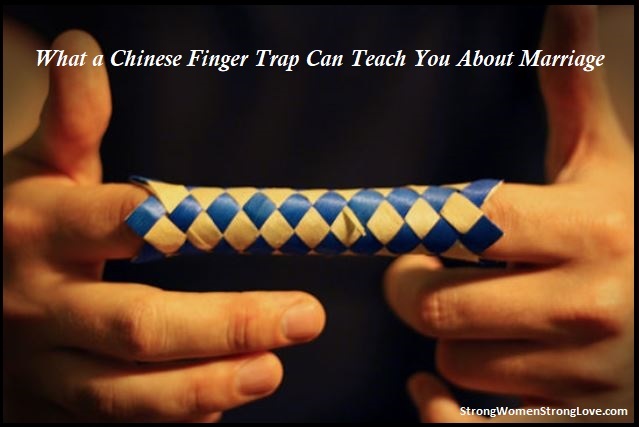by Strong Women Strong Love | Apr 17, 2018 | Passionate Partnership, Personal Power |

You probably know about the importance of diversifying when it comes to your finances. You understand, for example, that it’s unwise to have all of your money invested in the stock of one company.
But diversification is also important to keep in mind for your marriage. I was reminded of this truth while listening to a recent NPR Hidden Brain segment with Shankar Vedantam. He spoke with Eli Finkel, a social psychologist at Northwestern University, about how our rising expectations of marriage can create problems in our relationships.
Here’s how Finkel explains it. Before you got married, you likely turned to a wider circle of people to fill your different needs as a person. For example, you had fun nights out with your neighbors, you talked about your goals with your favorite colleagues, you kept fit with your yoga class and you confided in your best friend from college. If you still have that variety of people in your life, pat yourself on the back. What tends to happen when we marry, though, is that our circles shrink. The perception has built up in our culture that your spouse should be able to be everything to you since he’s your “soul mate.”
We haven’t always thought about marriage in such exalted terms. If you read my blog post about psychotherapist and author Esther Perel, Finkel’s ideas might remind you of hers. Perel writes:
We still want everything the traditional family was meant to provide—security, respectability, property, and children—but now we also want our partner to love us, to desire us, to be interested in us. We should be best friends and trusted confidants, and passionate lovers to boot.
We want our chosen one to offer stability, safety, predictability, and dependability. And we want that very same person to supply awe, mystery, adventure, and risk. We expect comfort and edge, familiarity and novelty, continuity and surprise. We have conjured up a new Olympus, where love will remain unconditional, intimacy enthralling, and sex oh so exciting, with one person, for the long haul. And the long haul keeps getting longer.
This all puts a lot of pressure on our marriages. And, sadly, it can even set you up for added heartbreak if you lose a spouse to divorce or death. Kristi Williams, an Ohio State University sociologist and editor of The Journal of Marriage and Family, believes that many of the problems divorced or widowed people suffer are because they over-relied on their spouse.
You will be happier and your marriage will be healthier if you can diversify your relationship portfolio. Here are a couple of ideas to try.
It’s easy to forget one of the most important relationships — the one you have with yourself. If you feel that you’ve lost some of who you are since you’ve been married, start making it a priority to be yourself and value yourself. Do your own thing sometimes. Take a class in something you’re interested in, even if it’s not his thing and he doesn’t want to join you. Revisit the dreams and interests you’ve been neglecting. You’ll feel more engaged and alive, which — bonus! — makes you more attractive to your husband.
You can also start rekindling some of the relationships you’ve let slide to the back burner. Elaine Cheung of Northwestern University has found that having a larger array of relationships to help you manage all the emotions of life makes you happier. And when you have additional emotional support sources besides your husband, you’re more likely to appreciate the unique role he does play in your life.
For more ideas like these, pick up a copy of my book Strong Women, Strong Love. It’s a comprehensive guide to caring for your marriage and yourself.
by Strong Women Strong Love | Jan 31, 2018 | Personal Power, Poisonous Patterns |

With Valentine’s Day coming up, are you looking for a romantic gift for your husband? I’ve got an unconventional idea for you.
Pick up a Chinese Finger Trap. Remember this tricky little toy from when you were a kid? If you do, chances are you also remember that the way out of the trap is counterintuitive. Once you have your fingers in the trap, pulling hard in opposite directions to get them out won’t work. The trap loosens only when you relax and gently slide your fingers out.
That’s actually a great metaphor for the relationship patterns we can find ourselves stuck in. You know how it goes: One partner habitually does something and the other always has the same knee-jerk reaction. The same old back-and-forth leads to the same old fights.
Just as with the finger trap, the only way to escape relationship traps is to pause before you engage in your familiar, instinctive reactions. Relax and ease into doing something different. Breaking the automatic pattern, gives you the power to make a deliberate choice about what you want to do next.
The Chinese Finger Trap may not seem like the most romantic gift, but it can be a gentle visual reminder of the power of being thoughtful and calm in your relationship, rather than fighting furiously when your buttons are pushed.
Want to learn more about breaking out of relationship traps? You may enjoy my past blog articles on chasing and complaining, two common destructive patterns that can also keep you trapped.
by Strong Women Strong Love | Jan 15, 2017 | Persistent Pressures, Personal Power |

You might have seen this humorous bit of wisdom in your social media feeds:
Almost everything will work again if you unplug it for a few minutes. Including you. – Anne Lamott
There’s a lot to be said for those wise words. Give yourself breaks from the technology that seems to overtake our lives sometimes. It’s one of the healthiest things you can do for yourself and for your relationships.
Doing vs. Being
We live in a culture of busyness. Nothing demonstrates that more than our connection to our devices. We always seem to be scanning for new emails, texts and social media posts – a constant stream of information and things to do.
Living this way, though, makes it difficult to thrive.
Our brains function in two modes. The first one is doing. When we’re in doing mode, we’re focused on our goals, or we’re thinking about something that’s already happened. We’re either planning the future or reflecting on the past in some way.
The other mode is being. In being mode, we’re fully present and engaged with what’s right in front of us. Perhaps that’s feeling invigorated by a morning run or having a pleasant, intimate moment with your spouse.
The Problem with being Stuck
The technology we’re surrounded by these days makes it easy to get stuck in doing mode. The brain loves new information and it’s now possible to have a constant stream of it, day or night. It can be extremely difficult to unplug from this constant stimulation.
However, one of the inevitable problems when we spend too much time in doing mode is becoming emotionally off balance. Our brains need stimulation, but also rest and restoration.
Imagine your brain is like a snow globe. Too much doing leaves your brain feeling like the snow globe has been shaken up. It’s difficult to see clearly what’s going on in your life. You’ll make worse decisions, be emotionally more reactive, and be much harder to connect with.
We need to spend time in being mode to bring our brains back into balance. But a lot of us have the tendency to just keep pushing harder and harder, doing one thing after another. And our ever-present technology makes that even easier. Times we might have been forced to take a break in the past (for example, commuting or standing in line) we now fill with even more doing.
This just isn’t a sustainable way to live.
Shift Modes
We have to fight our tendency to think that things will be better if we can just do more. In fact, the opposite is true. If your life is feeling out of whack right now, I’m willing to bet it’s not because of the things you need to do. Instead, you’re probably craving more time just to be.
Make a list of things that pull you into the state of feeling present and engaged. Some common activities that can get us back into being mode are listening to music, exercising or moving in other ways, praying, meditating or deep breathing. Art, engaging a loved hobby, or being in nature can also help bring us into the present.
But if the thought of adding one more activity (even beneficial ones like these) to your day makes your head spin, you can turn anything you already do into one that mentally restores you. When you’re eating, put down your phone, pull yourself into the present, and actually taste your food. When you’re walking from your car to your office, refrain from checking your email, take a deep breath, and just notice the world around you.
Experiment some with unplugging this week. As you spend more time in being mode, you should feel emotionally steadier and less stressed. And you’ll probably also notice that you’re more present for the important people in your life.
by Strong Women Strong Love | Jan 2, 2017 | Personal Power, Principal Priorities |

Is this the marriage you wanted? I know that’s a blunt question. But take a moment to be really honest with yourself.
If your relationship isn’t what you want it to be, what are you doing about it?
Because there are things you can do.
It’s easy to buy into the common idea that if your partner were your true soul mate, he would instinctively fill all of your needs. That simple expectation can set your relationship up for trouble by putting you into a passive role in your marriage.
The reality is that you have some ability to shape your marriage. As I’ve said before, there is no neutral in a relationship. You’re either building up your marriage or tearing it down. Take an active role in your relationship to help it grow into one that meets your needs.
Even if your marriage does feel perfect right now, don’t assume it doesn’t need daily maintenance. Marriages can change for the better or for the worse depending on your everyday actions.
Here are just a few ideas for actively getting — or keeping — your marriage on track. You can find many more in my book Strong Women, Strong Love.
- Take care of yourself first. If you’re trying to work on your relationship while you feel personally depleted, you’re not going to get too far. When you’re perpetually tired and stressed, you lose some key relationship skills, like patience and being a good listener. Take a few extra self-care steps this week, whether that means catching some extra sleep or making time for things that bring you joy. You’ll feel better and your relationship will benefit.
- Make marriage maintenance a daily habit. You don’t need a whole different life (you know, one with more time, money or distance from your in-laws) to have a better marriage. Instead, remember that you can improve your relationship just by being a little more mindful in moments you share every day. Put away your phones when you talk. Remember to say thank-you. Add more affectionate touch. And make sure conflict always stays in the respectful zone.
- Create a marriage-friendly lifestyle. You’re probably juggling lots of different priorities — and all of them feel urgent. Your relationship can get lost in the shuffle. Take a look at how you spend your time. Are there activities or obligations you can let go of in order to devote more time to you marriage and other things that really matter?
Your marriage is always a work in progress. What small steps can you take this week to move it closer to where you want it to be?
by Strong Women Strong Love | Dec 14, 2016 | Personal Power, Principal Priorities |

Are you looking for a New Year’s resolution? I have a powerful one for you.
All it involves is saying a single two-letter word. It’s simple, but it’s not easy. At least not at first. Here it is:
Say NO. A lot.
The very idea of making “no” a bigger part of your vocabulary might unsettle you. I’ve seen that many women tend to feel very uncomfortable around this one little word. For some of us, saying no feels almost like an act of aggression.
Here’s the thing, though. None of us — no matter how capable and generous we are — can say yes all the time. Every time you say yes to one thing, you’re saying no to something else at the same time. Yes and no are like flip sides of the same coin.
So you have to get very deliberate. What are the important things in your life that you always want to say yes to? Maybe it’s having weekends free for your family, or enough time for the yoga classes that make your body and spirit strong. When you know what your yeses are, it gets easier to say no to other things.
It’s wise to start small when you’re learning to say no. You don’t have to leap right into a face-to-face announcement to your mom that you’re not spending Christmas Day at her house like you usually do. Pick a request that’s a little less emotionally loaded first — like turning down a telemarketer that wants just a few minutes of your time to make a pitch (“Thank you so much, but I’m not interested. Goodbye.”) And give yourself permission to take the easy way out. Say no by text. Or just don’t speak up first at a meeting when volunteers are being recruited.
Even then, you might feel guilty about saying no.This doesn’t mean you’re a bad person. Sometimes guilt is helpful, but sometimes it’s just a sign that part of you is uncomfortable and resisting change.If you can, just keep taking small steps, and you will find this kind of guilt tends to dissolve over time.
Saying no more frequently eventually opens up a sense of freedom. You can free yourself from time-wasting, meaningless activities, and use your time to do what you love with the people you love. You can free up space to take better care of yourself, whether that means sleeping and exercising more or delving back into a long-neglected hobby.
“No” might not feel natural for you at first. But it’s an essential word to master. So what will you say no to in 2017?
by Strong Women Strong Love | Dec 1, 2016 | Personal Power |

I’ll be upfront with you: One of the best gifts you can give yourself and your husband this time of year is being direct.
Kind directness keeps the lines of communication open in your marriage. It keeps resentments from taking root. It helps make sure you’re both operating from the same set of expectations.
Yet being direct is hard for many women. Why is that? Why are we so uncomfortable asking for what we need or telling others what’s going on with us?
A lot of it has to do with how women have been raised in our culture. You may have been taught to anticipate everyone else’s needs — your husband’s, your kids’, your boss’s. And I bet you’re very good at it. You probably know the subtle signs that your husband is ready to leave a party, or that your daughter could use some extra encouragement before her semester exams.
Because we’re so adept at reading others and knowing what they need, I think we feel a little disappointed when we have to come out and say the things that we think others, especially our husbands, should have figured out on their own. I’ve heard a version of this sentiment from women many times: “I don’t want to have to tell him. He should just know.” It’s as if getting what they want has less value if their husbands don’t intuit it.
Some of us have also been taught that it’s somehow rude to communicate directly. Maybe, for example, you’ve gone on at length about how busy you are at work in hopes that your husband will offer to take on more gift shopping or holiday travel prep. Dropping hints might work with other people who are fluent in indirect communication. But it may just go right over your husband’s head.
Wouldn’t it be easier just to ask? Most husbands relish the chance to make their wives happy. And they’d appreciate more information on how to do that. He doesn’t care about you any less just because you have to come right out and tell him the gifts you’d like or that you’d rather stay home more this holiday season instead of traveling. In fact, he’d be thrilled to know.
This holiday season, look for opportunities to be more direct. See how it feels and how others react. If you’re still a little uncomfortable, that’s OK. You’re learning something new. Keep practicing. It really does get easier.







